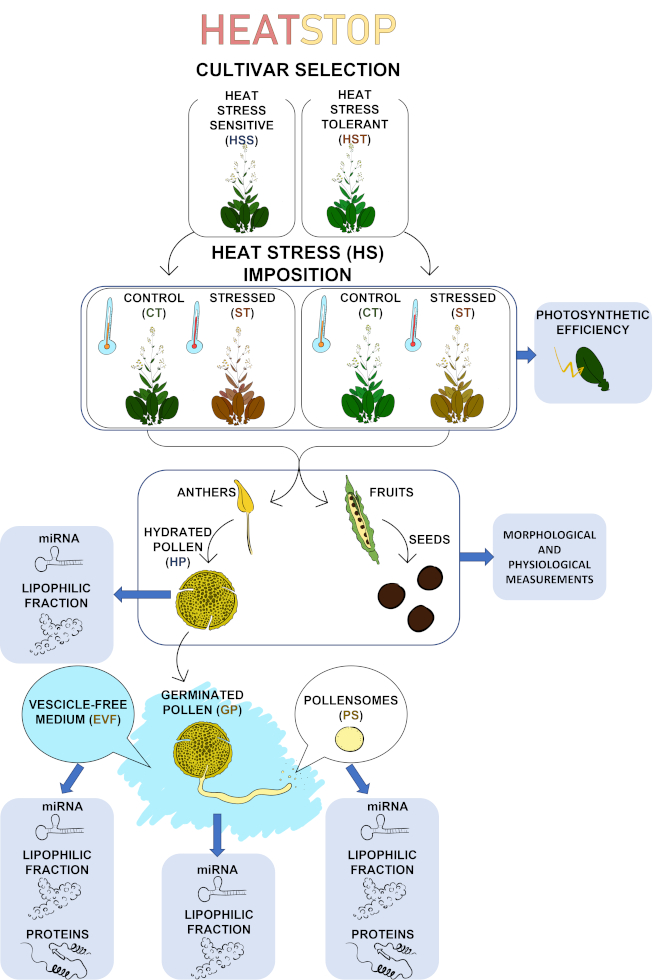"Heatstop" is a two-year research project coordinated by Prof. Stefano Del Duca from the University of Bologna and Prof. Angelo Gismondi from the University of Roma Tor Vergata. The project investigates pollen-pistil interactions in agricultural crops such as rapeseed.
More specifically, this research aims to study the signaling molecules involved in pollen-pistil interaction under standard conditions and high temperatures. It pays particular attention to the content of nanovesicles in terms of proteins, lipophilic compounds, and miRNA to understand if they could regulate not only the signal transduction pathways in fertilization but also the molecular mechanisms underlying pollen development and activity. All these aspects will also be analyzed in the context of the response to high temperatures, to investigate possible changes in the lipid composition of pollen and nanovesicle membranes, secreted proteins, and miRNA that could be responsible for male sterility under high-temperature conditions. The acquired data will contribute to a better understanding of the impact of global warming on agricultural productivity and the molecular mechanisms of plant response aimed at mitigating this stress typical of ongoing climate change.
HEATSTOP has three main goals:
Achieve a better understanding of the communication between pollen and stigma by studying the pollen secretome.
Evaluate the potential presence of pollen-derived nanovesicles (pollensomes, PS) in the pollen secretome and reveal their content and biological role.
Determine if heat stress (HS) can influence the fertility of Angiosperms by disrupting interactions between pollen and female tissues.
In more detail, this research primarily aims to investigate the signaling molecules involved in pollen-pistil communication, under both standard conditions and heat stress (HS), with particular attention to the content of PS in terms of proteins, lipophilic compounds, and miRNA.
The project will study several molecules that may play a role during pollen-pistil interaction in canola plants. Proteins of interest will be studied by electrophoresis, western blot and activity assays.
In parallel, the profiling of cytoplasmic miRNAs of the pollen and lipophilic fraction before and after germination, as well as those present in nanovesicles (pollensomes, PSs), will be defined to understand whether they may regulate not only the fertilization signal transduction pathways, but also the molecular mechanisms underlying pollen development and activity.
Indeed, there is a surprising knowledge gap in the literature on the role of miRNAs in this important context of the plant life cycle.
All these aspects will also be analyzed in the light of the high-temperature (HS) response to study possible changes in the lipid composition of pollen and PS membranes, secreted proteins, and miRNAs that could be the drivers of HS-induced male sterility.
Finally, HS-induced changes at the molecular level will be correlated with those detectable at the phenotypic level to gain a comprehensive view of the stress response. In summary, HEATSTOP will elucidate the function of PS and secreted molecules during pollen germination, both under standard greenhouse conditions and in the presence of environmental stress (i.e., HS).
To carry out the present study, a multidisciplinary methodological framework (including botany, biochemistry, molecular biology, and bioinformatics) will be applied, taking advantage of state-of-the-art experimental approaches (e.g., Next Generation Sequencing NGS; metabolomics).
